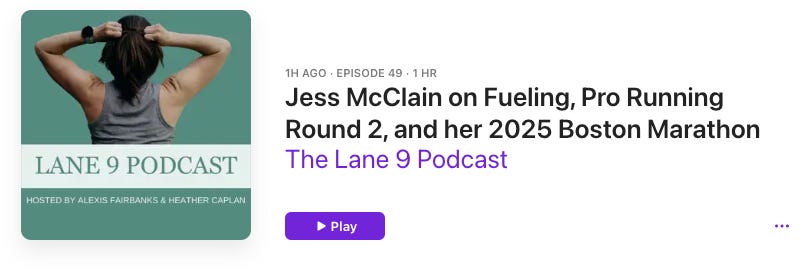Big plates & Lane 9 in Boston
Notes from our episode with Jess McClain and plans for the Female Athlete Conference 2025
“If you want to be a little person, eat off of little plates,” shared a nutritionist, with Jess McClain’s (neé Tonn) Stanford Track and Field team, in the early 2010s.
As McClain shared with us on the Lane 9 Podcast, “It still sticks with me to this day, and I don’t ever take that advice, it’s stupid.”
And that’s the thing. We tend to remember these strange, disordered, and often fat-phobic tropes about nutrition and “health”, even if we know it’s not good or health-promoting advice. It may pop into our heads on an off day—a bad body image day, after a tough run, during a low mental health period, etc.—even if we’ve never taken it seriously. These things live rent free in our psyche, taking up space. Wasting our mental energy, as we practice reminding ourselves to ignore that societally-conditioned voice, saying “Be smaller.”
(“I might eat off a little plate, but I'm filling that [plate] like four times,” McClain added.)
I (Heather) have heard so many of these sentiments from clients, running buddies, and conversations on airplanes with strangers. I hear ‘So, what do you think about…’ and I can almost be 100 percent certain some wacky nutrition advice will follow. But I’ll gladly debunk and help you move on, freeing up that brain space for something else entirely.
What you need is unique to you.
When it comes to weekly mileage, grams of carbohydrates per hour, rest days, mental health check ins, nutrition support, coaching style, and any other factor—big or small—the first calculation that matters is how these things add up to you enjoying your sport, and supporting your health while doing it.
In Lane 9, we love a Big Plate.
We love a reminder that the size of your plate doesn’t determine how much caloric energy your body needs, or how your body exists in space. We love a reminder that a coach/program prioritizing weigh-ins regularly, and/or one race weight for an athlete, doesn’t have all the answers. A reminder that success isn’t found within one calculation, one pre-race routine, one cup of BiCarb, or one specific way to train and compete.
This could also be a metaphor for how McClain approaches her own professional running career, round 2: She allows herself a big plate, knowing exactly what she likes to fill it with.
She left Brooks in 2018, after a string of injuries, mental health struggles, and races that didn’t go according to plan. Eventually she got back to running competitively on her own terms, while living back home in Phoenix AZ and working full time. By the time she lined up at the 2024 Olympic Marathon Team Trials in Orlando, she thought she was ready to close the marathon chapter, the high-level running chapter.
“I went into it like, oh, this is probably my last hurrah,” she shared on the podcast. “I thought, this is a great way to close the [marathon] book.”
As most of us know, that’s the opposite of what happened! She placed 4th, missing the 2024 Paris Olympic Marathon Team by only 15 seconds. Long story short, she signed with Brooks again, and had a hell of a year on the run. Just a few weeks ago, she placed 7th overall (female) and first American across the line at the 2025 Boston Marathon in 2:22:43, beating her personal best time by over 3 minutes.
She’s running well, she’s fueling more than ever before, she’s sticking to a lower-than-most-pros weekly mileage, and she’s still working for two non-profits in the Phoenix area (#LoveUp and #LovePup).
Her plate is full, and it’s not small. This is what’s working for her.
Lane 9 in Boston
I’ll be in Boston for the 2025 Female Athlete Conference early next month (June), and am planning a casual event for Lane 9 clinicians, coaches, and athletes—anyone who wants to gather in a space where talking about food, body, and periods is the norm!
We’re hoping to host something on Wednesday June 4th, in the evening.
Click here to join a specific mailing list for Boston event updates.







